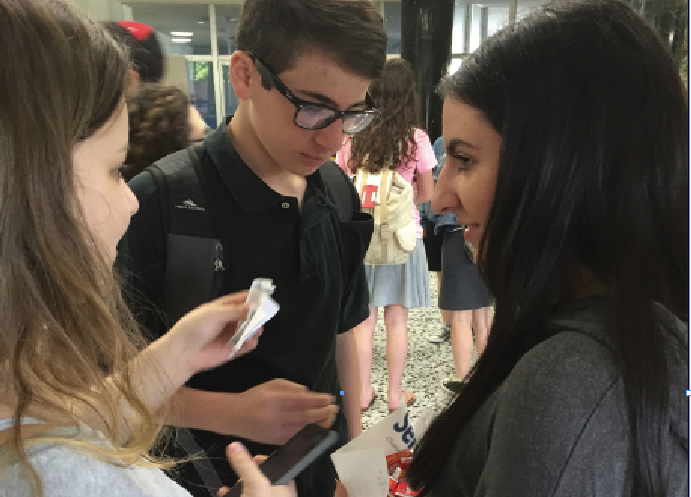‘Reusch Bucks’ add flavor to a lesson on supply and demand
SWARM: Kayla Ablin, Aaron Cohen and Ariella Cohen bought and sold chocolate in the JCC lobby March 10.
April 30, 2015
During breakfast March 10, a wave of students poured into the JCC lobby, suddenly overcome with cravings for candy and chocolate.
“If you want chocolate and you have Reusch Bucks hit me, Rose, Natacha, or Ariella up!!” wrote Kayla Ablin on Schoology earlier that morning.
“Or buy from J.S.S (Josh, Sim, Seffi) we are located anywhere in the JCC best prices guaranteed,” commented Yosef Arnan.
The chocolate was real, but the business enterprises had been set up by History teacher Mr. William Reusch for his Economics classes. His students were testing business strategies by selling candy to anyone who had “Reusch Bucks,” white or yellow bills with his picture on them, handed out the day before.
Teams of wholesalers and retailers each tried to sell offerings ranging from Dum Dum lollipops to assorted Hershey’s chocolates. During any kind of break, whether it was at meals, davening or even in between classes, students swarmed around each team, eagerly vying to buy their treats.
There was also a competition, and each group was given the objective to make as much profit in Reusch Bucks as they possibly could.
“I’m teaching supply and demand, the basic fundamental idea of economics,” Mr. Reusch said in an interview later, “[including] how to control the supply and how to raise the demand.”
Each wholesale group was given 120 pieces of candy to sell to the retailers. There were about 10 different teams in each of the Economics classes, half retail and half wholesale.
Soon, the project became realistic in unexpected ways. Once the teams learned their way around the system, they started breaking the rules.
“Some people printed out Reusch Bucks,” said senior Josh Goldner, a senior in a retail group who sold lollipops and chocolate. “And some were even using real money to convince people to buy candy and give them their Reusch bucks.
“It showed that a lot of people under these settings can become corrupt very easily,” Josh added. Mr. Reusch was aware of the situation, but didn’t try to stop it.
“After the project, one of the questions I asked was what types of shady dealing was going on,” Mr. Reusch said. “How does that relate to the shady dealings that really go on in real life?’”
He thought about what to do, then decided to recognize and learn from it, rather than taking off points from the assignment for those involved. Students now know that this stuff actually happens in real business, he said, and better understand why.
As a continuation of what the students learned in the project, Mr. Reusch then helped students analyze current economics using their newly gained skills.
“It was really exciting,” said senior Mati Hurwitz. “We learned how businesses become successful, including different tactics that companies use to sell products. I think it was a great overall learning experience and it was great to have some fun in competition at the same time.”
Mr. Reusch agrees and hopes to run the project again – perhaps with a new component.
“I expected them to care that much, so the fact that they did was awesome,” he said. “We can’t always do projects, but when they are successful it makes me want to do it more.
“Next year,” he added, “I’ll probably have government agencies watching over the other groups.”













